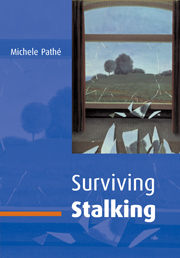Book contents
- Frontmatter
- Contents
- Acknowledgments
- Introduction
- 1 What is stalking?
- 2 How common is stalking?
- 3 Who stalks?
- 4 Could I be assaulted?
- 5 Can stalkers be treated?
- 6 Who are the victims of stalking?
- 7 The impact of stalking
- 8 Reducing your chances of victimization
- 9 Evading the stalker
- 10 Navigating the criminal justice system in the United States of America
- 11 Navigating the criminal justice system in the United Kingdom
- 12 Navigating the criminal justice system in Australia
- 13 Should I just disappear?
- 14 How do I deal with the emotional impact of stalking?
- 15 How you can assist victims of stalking
- Conclusions
- References
- Reading guide
- Appendix 1 Other resources
- Appendix 2 Protection from Harassment Act 1997
- Appendix 3 Sample restraining order under Protection from Harassment Act 1997
- Appendix 4 Criminal justice system flow chart, UK
- Index
12 - Navigating the criminal justice system in Australia
Published online by Cambridge University Press: 04 September 2009
- Frontmatter
- Contents
- Acknowledgments
- Introduction
- 1 What is stalking?
- 2 How common is stalking?
- 3 Who stalks?
- 4 Could I be assaulted?
- 5 Can stalkers be treated?
- 6 Who are the victims of stalking?
- 7 The impact of stalking
- 8 Reducing your chances of victimization
- 9 Evading the stalker
- 10 Navigating the criminal justice system in the United States of America
- 11 Navigating the criminal justice system in the United Kingdom
- 12 Navigating the criminal justice system in Australia
- 13 Should I just disappear?
- 14 How do I deal with the emotional impact of stalking?
- 15 How you can assist victims of stalking
- Conclusions
- References
- Reading guide
- Appendix 1 Other resources
- Appendix 2 Protection from Harassment Act 1997
- Appendix 3 Sample restraining order under Protection from Harassment Act 1997
- Appendix 4 Criminal justice system flow chart, UK
- Index
Summary
Police
Police should be involved as early as possible in the course of events. In a life threatening situation dial 000. At other times, if you suspect you are being stalked you should promptly notify your local police branch. You can ask to speak to a female police officer, particularly if the harassment has involved sexual assault. You may feel more comfortable if a friend, relative or legal adviser accompanies you. In addition to helping to order your thoughts and place less of a burden on your memory in these stressful circumstances, providing documentation will assist the police in their investigations. Remember that stalking often results in a complex trail of behaviours over many months or even years, which can present a formidable task for under-resourced law enforcement agencies. You will need to provide the police with any information you have on the suspect, including a description (with a recent photograph wherever possible), the nature and duration of the harassment, any legal action to date (show them the relevant documents) and any instances of aggression or threats. Be honest with the police about the nature of any prior involvement with the stalker. You should inform the police if you think the stalker has a criminal or psychiatric history and, in particular, whether you suspect he is in possession of any firearms or other weapons.
- Type
- Chapter
- Information
- Surviving Stalking , pp. 107 - 118Publisher: Cambridge University PressPrint publication year: 2002



